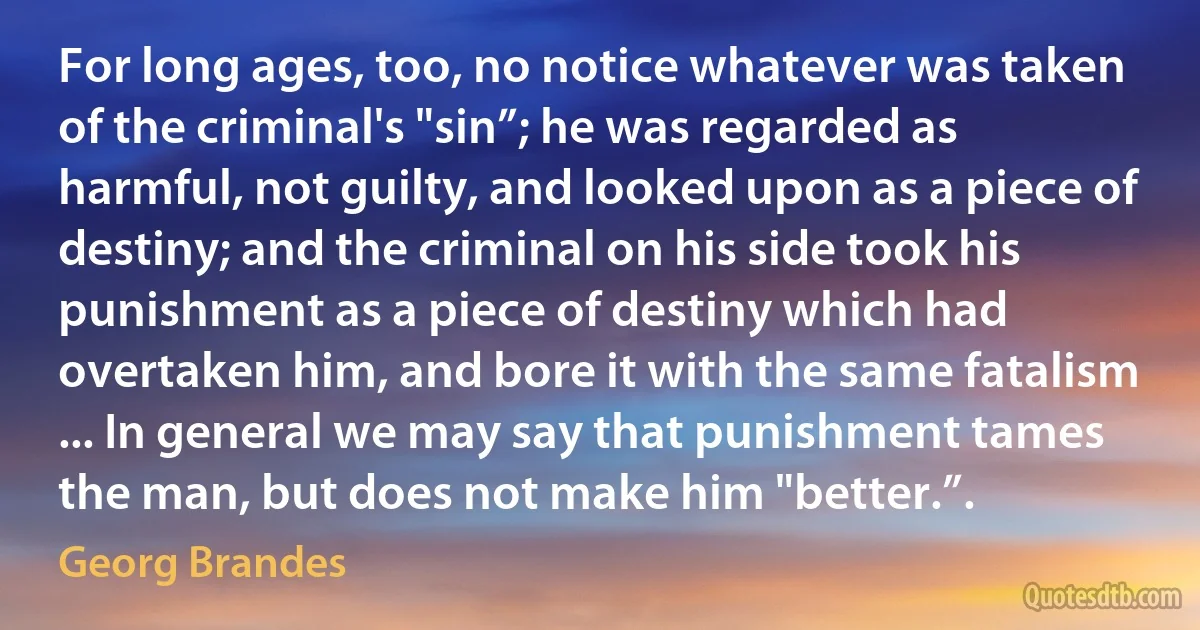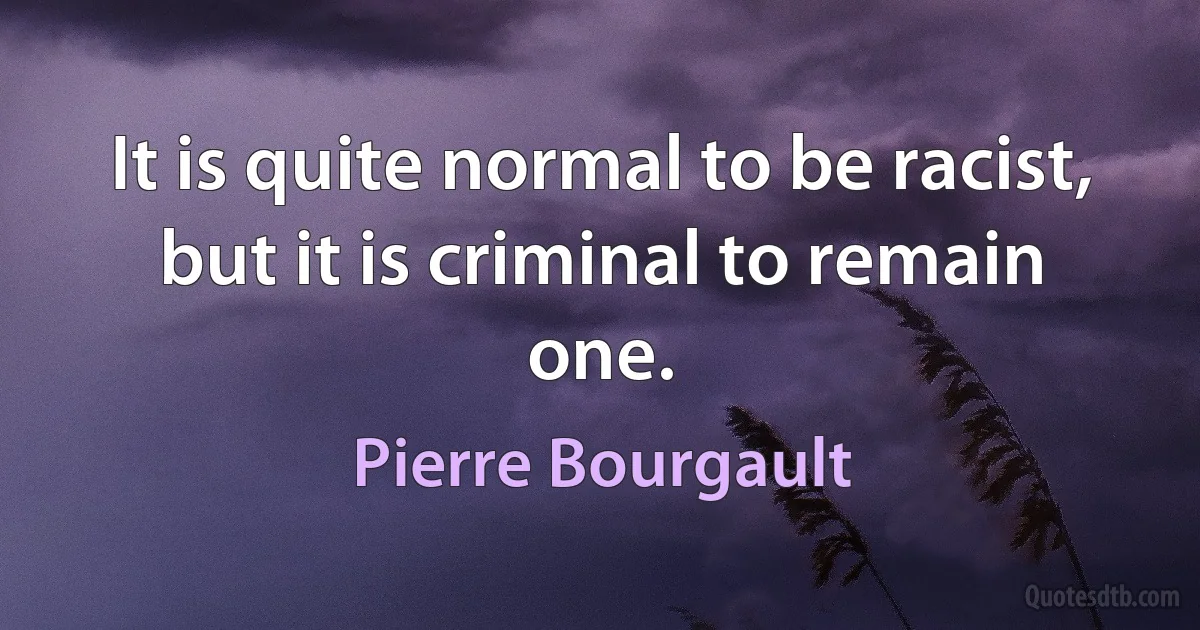Criminal Quotes - page 12
We are programmed to find sex pleasurable for one simple reason-because animals who mate have offspring. Those who do not mate have none. Traits that result in successful reproduction get reinforced and passed on. Evolution is that simple.
It is therefore useless to bemoan as evil the fact that men tend toward aggression. Among our ancestors, aggression often helped males have more offspring than their competitors. "Good” and "evil” had little to do with it.
That is, until we reached consciousness, at which point, good and evil became pertinent indeed! Behaviors which might be excusable in dumb beasts can seem perverted, criminal, when performed by thinking beings. Just because a trait is "natural” does not oblige us to keep it.

David Brin
He [Abbé Cénabre] had often reflected on the plight of even the most illustrious of those renegades who finish up engaged in a monotonous argument they can never quite extricate themselves from and seem to be insulting the God they have offended, dragging Him along with them like a fellow criminal shackled to them.... He thought, not without some justification, that where such tortured and anxious nihilists had made their greatest mistake was in having freed only their intellects, leaving belief to go on surviving and festering in the most hidden and least accessible parts of their sensibility. Such a deep and hidden contradiction is all the more destructive because they cannot form a clear idea of it, or indeed express it, except in terms of stammering, repeated, pointless, and childish expressions of hatred. They no longer have any part in a faith that still holds them in abject and slavering thrall. It matters little that they think they have destroyed it.

Georges Bernanos
Nietzsche proposes the following brilliant hypothesis: The bad conscience is the deep-seated morbid condition that declared itself in man under the stress of the most radical change he has ever experienced when he found himself imprisoned in perpetuity within a society which was in- violable. All the strong and savage instincts such as adventurousness, rashness, cunning, rapacity, lust of power, which till then had not only been honoured, but actually encouraged, were suddenly put down as dangerous, and by degrees branded as immoral and criminal. Creatures adapted to a roving life of war and adventure suddenly saw all their instincts classed as worthless, nay, as forbidden. An immense despondency, a dejection without parallel, then took possession of them. And all these instincts that were not allowed an outward vent, turned inwards on the man himself feelings of enmity, cruelty, ... violence, persecution, destruction and thus the bad conscience originated.

Georg Brandes
It would be a mistake to think...that by what we are doing tonight we are giving a vote of confidence or congratulation to homosexuality. Those who suffer from this disability carry a great weight of loneliness, guilt and shame. The crucial question, which we are nearly at the end of answering decisively, is, should we add to those disadvantages the full rigour of the criminal law? By its overwhelming decisions, the House has given a fairly clear answer, and I hope that the Bill will now make rapid progress towards the Statute Book. It will be an important and civilising Measure.

Roy Jenkins
The fines on the engineering union and the heavy damages that may be levied against the transport union go well beyond questions of economic policy and strike at the roots of free trade unionism. Conscientious objection to the law is not a criminal act. It is not the same as an attempt to overturn the Government and set up a new one, without elections, by the direct use of industrial strength.

Tony Benn
The law,” he said, "is above the criminal and the judge, and rules them both. The law is inescapable, for an action is either lawful or unlawful. The law, indeed, may be said to have a life of its own, an existence quite apart from the finite lives of the beings who administer it. The law governs every aspect of human behavior; therefore, to the same extent that humans are lawful beings, the law is human. And being human, the law has its idiosyncrasies, just as a man has his. For a citizen who abides by the law, the law is distant and difficult to find. For those who reject and violate it, the law emerges from its musty sepulchers and goes in search of the transgressor.

Robert Sheckley
I feel no moral compunction in the slightest at my so-called crime. If a man cannot retain control of his own body, then he deserves to lose it. I have observed, during a long and varied lifetime, that men will give their bodies to any rogue who asks, and will enslave their minds to the first voice that commands them to obey. This is why the vast majority of men cannot keep even their natural birthright of a mind and body, but choose instead to rid themselves of those embarrassing emblems of freedom.”
"That,” Detective Urdorf said, "is the classic apologia of the criminal.”
"That which you call a crime when one man does it,” Kraggash said, "you call government when many men do it. Personally, I fail to see the distinction; and failing to see it, I refuse to live by it.

Robert Sheckley
If you want to get an idea of a friend's temperament, ethics, and personal elegance, you need to look at him under the tests of severe circumstances, not under the regular rosy glow of daily life. Can you assess the danger a criminal poses by examining only what he does on an ordinary day? Can we understand health without considering wild diseases and epidemics? Indeed the normal is often irrelevant.

Nassim Nicholas Taleb
Though I'm no expert on all things Pantera, I did hear their version of 'Cat Scratch Fever' and it was exceedingly white. No soul, no balls, no feel. Caucasian all the way. Elements of dope, booze and heroin disconnect quite apparent as usual. There is no excuse for such horrifically negative, irresponsible, criminal, America-wrecking behavior as such chimp-like substance abuse. Period. They appeared as Ozzy-like zombies on TV. Ya think. American drunks and dopers are allahpuke terrorists' favorite allies. Damn them. Damn them all.

Ted Nugent
When the people of one country understand how the people in another country are duped, like themselves, in war-time, they will be more disposed to sympathize with them as victims than condemn them as criminal, because they will understand that their crime only consisted in obedience to the dictates of authority and acceptance of what their Government and Press represented to them as the truth.

Arthur Ponsonby
Certain forms of sex which do not lead to children are at present punished by the criminal law: this is purely superstitious, since the matter is one which affects no one except the parties directly concerned... The peculiar importance attached, at present, to adultery is quite irrational... Moral rules ought not to be such as to make instinctive happiness impossible.

Bertrand Russell
Moreover, every effort should be made under the law to expedite the proceedings of justice in the case of such an awful crime. But it cannot be necessary in order to accomplish this to deprive any citizen of those fundamental rights to be heard in his own defense which are so dear to us all and which lies at the root of our liberty. It certainly ought to be possible by the proper administration of the laws to secure swift vengeance upon the criminal; and the best and immediate efforts of all legislators, judges and citizens should be addressed to securing such reforms in our legal procedure as to leave no vestige of excuse for those misguided men who undertake to reap vengeance through violent methods.

Theodore Roosevelt
In such cases, moreover, it is well to remember that the criminal not merely sins against humanity in inexpiable and unpardonable fashion, but sins particularly against his own race, and does them a wrong far greater than any white man can possibly do them. Therefore, in such cases the colored people throughout the land should in every possible way show their belief that they, more than all others in the community, are horrified at the commission of such a crime and are peculiarly concerned in taking every possible measure to prevent its recurrence and to bring the criminal to immediate justice. The slightest lack of vigor either in denunciation of the crime or in bringing the criminal to justice is itself unpardonable.

Theodore Roosevelt
Especially is this true where the lynching is accompanied with torture. There are certain hideous sights which when once seen can never be wholly erased from the mental retina. The mere fact of having seen them implies degradation. This is a thousandfold stronger when, instead of merely seeing the deed, the man has participated in it. Whoever in any part of our country has ever taken part in lawlessly putting to death a criminal by the dreadful torture of fire must forever have the awful spectacle of his own handiwork seared into his brain and soul. He can never again be the same man.

Theodore Roosevelt
In a certain proportion of these cases the man lynched has been guilty of a crime horrible beyond description; a crime so horrible that as far as he himself is concerned he has forfeited the right to any kind of sympathy whatsoever. The feeling of all good citizens that such a hideous crime shall not be hideously punished by mob violence is due not in the least to sympathy for the criminal, but to a very lively sense of the train of dreadful consequences which follows the course taken by the mob in exacting inhuman vengeance for an inhuman wrong.

Theodore Roosevelt



